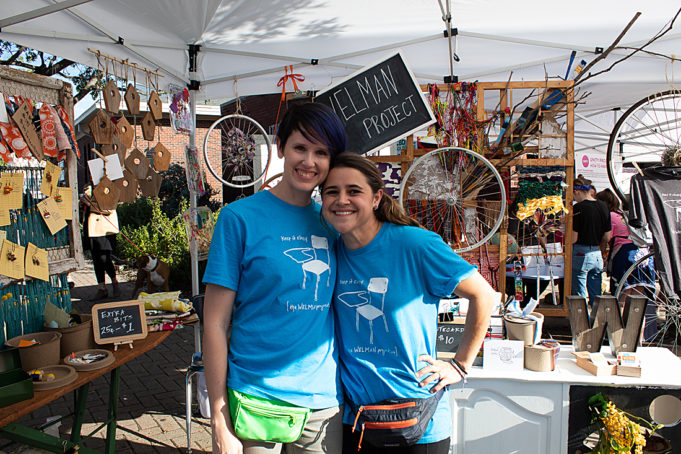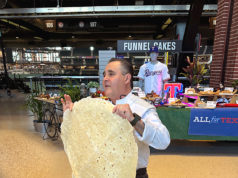The newest buzzword in philanthropy is social innovation. The idea is to address lingering societal problems like hunger and poverty in a novel way. Fort Worth-based Clean Slate (technically a for-profit venture managed by the Presbyterian Night Shelter) is one example that grabbed national headlines last year by demonstrating how individuals experiencing homelessness can be given low-skill jobs that can lead to permanent housing.
On Thursday night at Four Day Weekend Theater downtown, United Way of Tarrant County (UWTC) will award a total of $50,000 to three charities to ensure that social innovation programs continue to grow in Tarrant County. The ceremony will be emceed by the improv comedy troupe Four Day Weekend. When the comedians aren’t taking jabs at the UWTC hosts, they will be highlighting the plight of underserved communities in Tarrant County. The three-year-old grant program fills what UWTC CEO TD Smyers calls a glaring gap in UWTC’s philanthropic giving.
“What are we doing to empower the next great ideas that could move the needle on issues that we are struggling with?” he recalled asking himself three years ago.
His conclusion at the time was: nothing. To rectify this, Smyers examined programs across the United States that provide seed money for new charitable concepts. Specifically, he was looking for programs that fit a new model of social innovation. One regional example he gleaned insight from was Dallas-based GroundFloor, which combines seed money with private-sector mentorship to address problems related to education, financial stability, and health.
Early into his tenure, Smyers set a date for a UWTC-staffed team to draft their own social innovation program for Tarrant County. That project, KERNEL, is now in its third year. Local nonprofits with a new charity model are welcomed to apply each June. Accepted applicants enter a mentorship program with local business leaders to learn basic skills in fundraising, networking, accounting, and marketing. Applicants must communicate their group’s vision to a group of judges who narrow the pool down to three finalists every November. During a final round, KERNEL LIVE!, five judges decide how the pot of money ($50,000 this year) will be divided among the three finalists. If the process sounds a little like Shark Tank, that’s because the concept was partly influenced by the popular ABC TV show, Smyers said.
The first winner of the KERNEL grant in 2016 was Dream Outside the Box, a charity that delivers boxes full of engaging materials such as constellation projectors, model rockets, and engineering books to underprivileged children thinking about STEM careers. Kam Phillips, the nonprofit’s founder, said going through the KERNEL process helped her reflect on what her organization needed to grow. “We applied for sales and marketing funds,” she said. “We used [the seed money] to hire social media personnel to do targeted ads. It was the type of opportunity startups need to have the bandwidth to try things and see what works.”
This year’s finalists include: Rosa Es Rojo, which provides workshops, support groups, and other resources to Latinas living in high-risk cancer populations; Welman Project, which repurposes commercial waste for schools and other organizations in need; and Taste Community Restaurant, a pay-what-you-can eatery that provides high-quality food just south of downtown.
Since winning the 2016 KERNEL micro-grant, Phillips has seen her organization’s reputation grow. She said school districts are now asking to partner with her nonprofit. “Seed money is vital to innovation in Fort Worth,” she said. “When I started Dream Outside the Box in 2012, there was no such funding to help us get off the ground. I’m excited for the [2018 finalists] to be able to have that extra oomph that you truly need as a startup.”
Phillips is glad to see a major Fort Worth charity recognize that small startups can have big ideas. She hopes other philanthropic groups will look to individuals and new charities for innovative ideas.
Smyers said KERNEL is now a permanent part of UWTC’s annual budget. “This year, we’re giving $50,000,” he said. “Next year, it could be $100,000. We’re believers at the United Way that the philanthropic pie is not finite. We believe this is going to attract even more donors to the table.”
UPDATE: After the three finalists gave their final presentations to a panel of local business leaders during KERNEL LIVE!, the $50,000 pot was awarded to Welman Project ($25,000), Rosa Es Rojo ($15,000), and Taste Community Restaurant ($10,000).
KERNEL LIVE!
7pm Thu at Four Day Weekend Theater, 312 Houston St, FW. $25-75. 817-258-8000.












